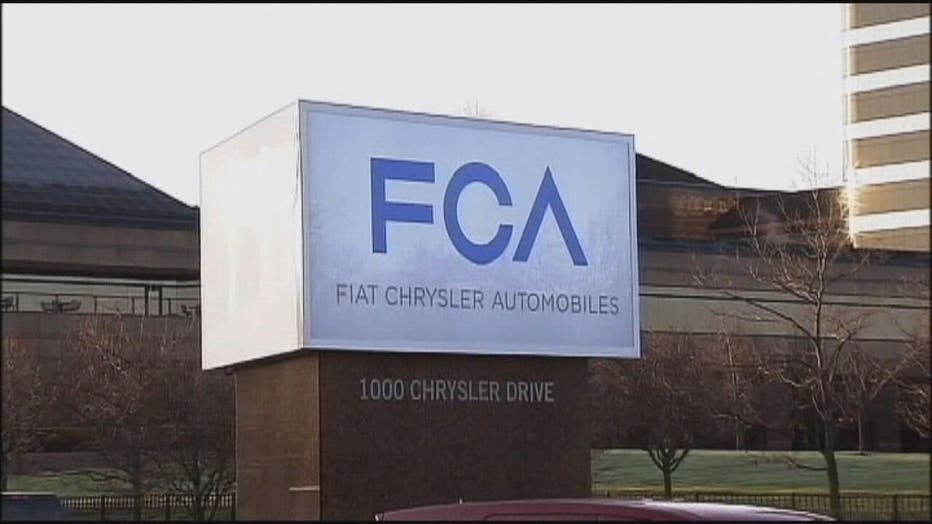Fiat Chrysler, Peugeot merging to create fourth-biggest carmaker
MILAN (AP) - Fiat Chrysler and France's PSA Peugeot said Thursday they have agreed to merge to create the world's fourth-largest automaker with enough scale to confront big shifts in the industry, including a race to develop electric cars and driverless technologies.
Italian-American Fiat Chrysler brings with it a strong footprint in North America, where it makes at least two-thirds of its profits, while Peugeot is the No. 2 automaker in Europe.

Both lag in China, however, despite the participation of Peugeot's Chinese shareholder, Dongfeng, and are playing catching up in developing electric vehicles.
Fiat Chrysler shares were trading up 9% at 14 euros in Milan, while PSA Peugeot shares were down 3.2% to 22.84 euros.
The 50-50 merger is expected to offer savings of 3.7 billion euros ($4 billion), which the automakers expect to achieve without any factory closures -- a concern of unions in both France and Italy where the carmakers have more overlap.
Fiat Chrysler's strongest brands are Jeep SUVs and Ram trucks and it is focusing on relaunching its premium and luxury brands, Alfa Romeo and Maserati, with a focus on hybrid engines. It still makes smaller cars under the Fiat marquee, mostly for the European and Latin American markets.
PSA Peugeot makes mostly small, city-friendly cars, family sedans and SUVs under the nameplates of Peugeot, Citroen and Germany-based Opel, which it bought in 2017. That is where the companies can expect to have the most overlap.
The new company would be worth $50 billion, with revenue of 170 billion euros ($189 billion). It would produce 8.7 million cars a year -- still behind Toyota, Volkswagen and the Renault-Nissan alliance, which make over 10 million each.
Once a merger is finalized, PSA Peugeot CEO Carlos Tavares will be chief executive of the new company, with Fiat Chrysler Chairman John Elkann becoming chairman. Fiat Chrysler CEO Mike Manley will have a senior executive role.
"This convergence brings significant value to all the stakeholders and opens a bright future for the combined entity," Tavares said in a statement.
Manley called it "an industry-changing combination," and noted the long history of cooperation with Peugeot in industrial vehicles in Europe.
The 11-member board will be made up of five members from each company plus Tavares, who is locked in as CEO for five years.
The combined company would be able to share in the cost of developing electric cars and autonomous driving, among other things, as well as to save on investments in vehicle platforms.
European automakers have been looking to mergers and alliances for years to share R&D costs and tackle the issue of overproduction on the continent.
"We have to face the challenges of electric cars and autonomous cars. To face this you need to have champions at the world level," French Finance Minister Bruno Le Maire told a news conference.
The French government has a stake in Peugeot through its investment bank and just five months scuttled a similar deal between Fiat Chrysler and French automaker Renault. There were no signs of resistance to this deal, beyond concerns for jobs.
Le Maire also wants the new group to create a European electric battery industry, something the French government has pushed for to ensure that European carmakers can reduce their dependence on U.S. and Asian battery technology.
The French state investment bank currently has a seat on the PSA board; Le Maire declined to answer at a press conference whether it would be retained.
There was no immediate comment from Italian officials.
Because of the overlap in European operations and product, there is concern among unions about job cuts, though the companies have promised to not close any plants.
The new company would continue to have offices in France, Italy and the United States, and shares would be traded in all three countries. The parent company would be based in the Netherlands, as is currently the case with Fiat Chrysler.
Both companies have strong shareholder participation by the founding families -- the Peugeots in France and the heirs to the Agnelli family in Italy, represented by Elkann.
As part of the agreement, the main shareholders -- the Peugeots, the Agnelli family investment arm Exor, as well as the Chinese investor Dongfeng and the French state investment bank -- agree to maintain their stakes for seven years. The only exception is that the Peugeots could increase their stake by up to 2.5% during the first three years by buying shares from Dongfeng and the French investment bank.
The next step in the deal is expected to be a signing of a Memorandum of Understanding, which could come before the end of the year.
------
Tom Krisher reported from Detroit, and Angela Charlton from Paris. Claire Parker in Paris contributed to this report.

